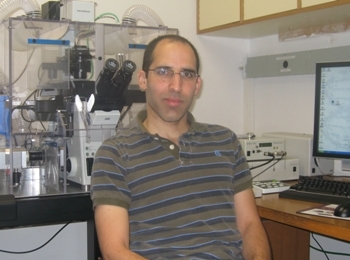| | 09 December, 2009
| | Hebrew University, American researchers identify genetic ‘trigger’ for stem cell differentiation | |
 | | Dr. Eran Meshorer |
|
A gene which is essential for stem cells’ capabilities to become any cell type has been identified by researchers at the Hebrew University of Jerusalem and the University of California, San Francisco.
The discovery represents a further step in the ever-expanding field of understanding the ways in which stem cells develop into specific cells, a necessary prelude towards the use of stem cell therapy as a means to reverse the consequences of disease and disability.
The identification of the gene, known as Chd1, was made by Dr. Eran Meshorer of the Alexander Silberman Institute of Life Sciences at the Hebrew University and Adi Alajem, a Ph.D. student in his lab, along with the UCSF researchers.
Embryonic stem (ES) cells, which are primary cells derived from the early developing embryo, are capable of giving rise, according to their environment and conditions, to any cell type -- a trait known as pluripotency. It was assumed that the ES cells have a relatively high degree of open chromatin, which is thought to enable their pluripotency, a theory which awaited proof.
Chromatin, which is found in all cells, is composed of DNA and its surrounding proteins and can be found in one of two conformations: closed chromatin (heterochromatin) – when the genetic material is packed in a way that prevents the expression of the genes -- and open chromatin (euchromatin) – when chromatin is accessible to the gene expression machinery. Different cells display varying degrees of open and closed chromatin as a function of the genes required for their function.
In their current study, which was published recently in Nature magazine, the researchers from the Hebrew University and UCSF showed, using mouse ES cells, that Chd1 regulates open chromatin in ES cells. The open chromatin conformation, maintained by Chd1, enabled the expression of a wide variety of genes, leading to proper differentiation into all types of specific cells. Depletion of Chd1 in embryonic stem cells led to formation of heterochromatin (closed chromatin) and prevented the ability of the cells to generate all types of tissues.
The study, therefore, showed a proven link between open chromatin in ES cells and their pluripotency – an important finding on the road to the implementation of stem cell applications in future medical treatment.
|
Downloadable File: TriggerStemCell.doc |
|


